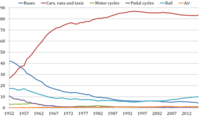
Photo from wikipedia
Extensive studies have been conducted on urban travel behavior, but rarely have addressed the travel behavior of special trip generators such as dormitory students. One of the most important student… Click to show full abstract
Extensive studies have been conducted on urban travel behavior, but rarely have addressed the travel behavior of special trip generators such as dormitory students. One of the most important student travel activities is non-mandatory (shopping or recreation) ones. The purpose of this study is to investigate the influence of the factors (both tangible and intangible) on the destination choice of such activities for future policy-making in line with appropriate distribution of demand in the city. Therefore, a questionnaire was designed and distributed among the students residing in Imam Khomeini International University dormitories. The results showed that taking individual perception in addition to their taste variation into account would enhance the ρ 2 (0) index of the mixed hybrid logit model by 0.175 than the standard logit model (with no latent variable and no consideration of taste variations). Furthermore, it was found that increasing the distance to a zone and the absence of direct accessibility to a particular zone via public transportation (buses or taxies) reduced the utility of traveling to that zone. Moreover, the presence of the central business district (CBD) of city in a particular zone and increasing the individuals’ perceived attractiveness of a zone (as the latent variable) increased the utility of traveling to that zone. The results of the mean marginal effect of “Attractiveness” variable show that the probability of five investigated zones increases by 12.2–49.3%. Therefore, this study concludes that both tangible and intangible factors are needed to better understand students' destination choice behavior for using in future policy-making.
Journal Title: International Journal of Civil Engineering
Year Published: 2020
Link to full text (if available)
Share on Social Media: Sign Up to like & get
recommendations!